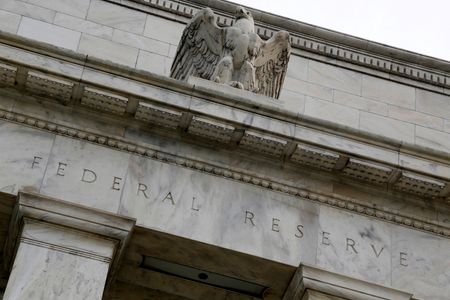By Pete Schroeder and Siddharth Cavale
WASHINGTON (Reuters) -The U.S. Federal Reserve on Wednesday proposed slashing by nearly a third the amount of so-called “swipe fees” banks can charge merchants for processing debit-card transactions, setting up a pitched battle between the two industries over potentially billions of dollars in revenue.
Citing data that showed the costs of processing such transactions had fallen by roughly half in recent years, the Fed proposed cutting the current cap from 21 cents per transaction to 14.4 cents per transaction.
The proposal, which is now open to public feedback, marks the first time the Fed has adjusted the fee cap after it was set in 2011. Banks charge retailers when processing debit-card transactions, and the Fed was ordered to limit those costs to a “reasonable and proportional” level as part of the 2010 Dodd-Frank financial reform law.
The fees generated $31.59 billion for lenders in 2021, according to Fed data.
Retailers and banks have sparred over the fees for years, with merchants complaining they are excessively high and pad bank profits, while financial firms argue retailers have failed to pass savings on to consumers via lower prices on products.
Retailers, who have pressed the Fed for a lower cap for years, praised the proposal, while vowing to try and push the limit even lower.
“Today’s proposed rulemaking signals an end to these outrageous markups,” said Austen Jensen, executive vice president of the Retail Industry Leaders Association, which represents large retailers.
The proposal would also trim an added fee that banks can charge from 0.05% of the cost of the transaction to 0.04%. However, the Fed proposed expanding a supplemental fee banks can charge to cover fraud-prevention services from 1 cent per transaction to 1.3 cents per transaction, citing a slight uptick in those costs.
In practice, the proposed changes would result in, on average, a 17.7 cent fee on a $50 transaction, down from a 24.5 cent fee currently, according to Fed officials.
The Fed also proposed automatically adjusting the cap every two years in response to fresh data.
Retail consultant Burt Flickinger said the new proposal was “100% positive” for retailers.
“Swipe fees are the second-highest cost for retailers behind labor but is a cost they get nothing out of,” said Flickinger, managing director of Strategic Resource Group, adding the proposal is negative for card issuers.
Shares in credit card companies Visa and Mastercard dipped last week after the Fed announced the meeting to reconsider the cap.
Walmart is likely to benefit the most, Flickinger said, because it “serves the highest number of cash- and credit-constrained consumers,” most of whom have only 1 credit card. He also expects Target, Macy’s and Kohl’s, to see some upside as consumers switch from their high interest rate co-branded credit cards to debit and cash.
Bringing down the cap will also help retailers servicing the agricultural and construction sectors where farmers and ranchers, for example, tend to make more purchases with debit cards and cash than credit. Tractor Supply <TSCO.O>, Menards, Home Depot, Lowe’s and Meijer are among chains likely to benefit, Flickinger said.
The retailers were not immediately available to comment.
In a letter to the Fed sent Friday, nine major bank trade groups said retailers don’t pass on to consumers savings and that claims they would do so in the future “should be viewed with robust skepticism.”
Analysts said that it is likely the Fed could face a legal challenge from either industry as it considers a new cap.
TD Cowen analyst Jaret Seiberg said in a note the Fed “likely expects both the banks and the merchants to challenge any final…rule even if that final proposal simply ratifies the status quo.”
(Reporting by Pete Schroeder and Siddharth Cavale; Editing by Michelle Price, Aurora Ellis and Rod Nickel)


